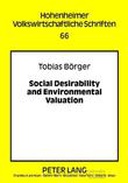Explore

Social Desirability and Environmental Valuation
Tobias Börger
2012
0 Ungluers have
Faved this Work
Login to Fave
Socially desirable responding (SDR) is an often-reported source of bias in survey interviews. It describes the tendency of a respondent to answer in a way that is socially desirable rather than to answer truthfully. This response bias also threatens the reliability and validity of survey-based environmental valuation techniques such as the Contingent Valuation Method (CVM). Therefore, the study deals with the assessment of the conditions for the occurrence of SDR in CVM interviews. A behavioral model is devised to take into account a set of factors triggering SDR responses. The impact of these factors of SDR on willingness to pay (WTP) responses is tested. The results reveal that the relevant factors do not affect WTP statements simultaneously but rather influence them in an independent manner. These findings can improve future CVM studies by identifying respondents who are prone to be influenced by SDR.
This book is included in DOAB.
Why read this book? Have your say.
You must be logged in to comment.
Rights Information
Are you the author or publisher of this work? If so, you can claim it as yours by registering as an Unglue.it rights holder.Downloads
This work has been downloaded 244 times via unglue.it ebook links.
- 141 - pdf (CC BY) at OAPEN Library.
Keywords
- Behavioural economics
- Biodiversity preservation
- Börger
- China
- Contingent Valuation Method (CVM)
- Desirability
- Economics
- Economics, finance, business & management
- environmental
- Environmental economics
- Methodology
- Psychology
- Response bias
- social
- Social desirability
- Social surveys
- Society & Social Sciences
- Sociology & anthropology
- Survey methodology
- thema EDItEUR::J Society and Social Sciences::JH Sociology and anthropology
- thema EDItEUR::J Society and Social Sciences::JM Psychology
- thema EDItEUR::K Economics, Finance, Business and Management::KC Economics::KCK Behavioural economics
- thema EDItEUR::K Economics, Finance, Business and Management::KC Economics::KCV Economics of specific sectors::KCVG Environmental economics
- Valuation
- Welfare measurement
- Yunnan
Links
DOI: 10.3726/978-3-653-01583-6Editions

